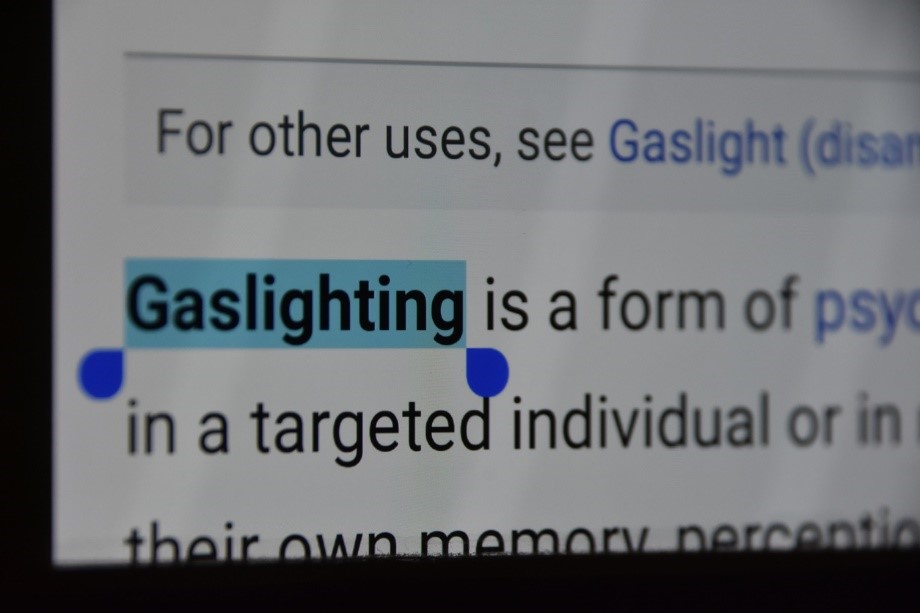
12 Apr Gaslighting
Are you a victim of Gaslighting?
Something feels off in your relationship. Something is not adding up. He’s out at all hours working on projects. Taking phone calls in the bathroom. You’re starting to suspect he’s cheating but he’s dismissed your concerns, ‘you’re acting crazy’ he says but are you?
If you’re feeling invalidated by your partner and you’re starting to question if you’re losing your mind, they might be gaslighting you.
What is gaslighting?
It’s likely you have heard the term mentioned. It has been popping up in television, film and the media a lot lately. But, it may surprise you to know that the term is almost 100 years old.
The term gaslighting comes from a 1938 play by Patrick Hamilton in which a husband slowly convinces his wife she is going mad by dimming the gaslights in their home and denying there is any change to the lighting.
Gaslighting is a type of psychological manipulation in which one person manipulates the other into doubting their own sanity.
Gaslighting can happen at work as well as in a personal setting. It could be as simple as a work colleague claiming your work as their own or a doctor invalidating your medical concerns.
But gaslighting is most common in intimate relationships. It generally happens where there is a collective trust that can be abused. It can take many different forms but most commonly, financial or emotional.
Financial Gaslighting
Financial gaslighting is when one partner is hiding money or misusing joint funds. They then convince the other partner that the money was never there.
In relationships there is often some sort of shared funds or joint account. If your partner is moving money around or hiding funds and denying it, they are financially gaslighting you.
Emotional Gaslighting
This type usually stems from some sort of infidelity.
Emotional gaslighting is when your partner denies the feelings or suspicions you have when they really are cheating. This is an effort to undermine your sanity and your confidence in yourself.
Most cheaters are gaslighters but not all gaslighters are cheaters.
If someone is cheating on their partner and they hide it from them and then deny their partner’s accusations, they are gaslighting them. But, not all gaslighters are also cheaters. Some partners who gaslight their significant other are after the psychological control.
Why do people gaslight their partners?
There can be all sorts of reasons. Commonly, this happens when one partner has some psychological issues and craves control over the other. Gaslighting is a form of psychological manipulation and abuse.
Signs you’re a victim of gaslighting
Countering
Countering is when someone questions your memory.
They may say things such as ‘you’re remembering that wrong’ or ‘you’ve got a terrible memory’.
Countering helps the abuser to foster a sense of distrust in their victim’s own memory. So they don’t even believe their own memories.
Invalidating
When your partner is trivialising and invalidating your feelings, they may be gaslighting you. They might do things like belittle your emotional responses or brush off your concerns. The phrases might be something like, ‘you’re too sensitive’ or telling you ‘you’re overreacting’ when it’s a valid reaction to their behaviour.
Denial
An abuser might flat out deny events or conversations that took place. ‘I never said that’ or ‘I never did that’ statements serve to undermine the victim’s confidence in their recollection of events.
Withholding
Withholding is when someone refuses to discuss something with you. They won’t have the conversation, might pretend to not know what you’re talking about or deny the event you are trying to discuss. Withholding communication stops the victim from airing their concerns.
Diverting
Diverting is when you’re having a conversation and they invalidate your claims or questions by changing the focus and shifting the blame.
They might say something like ‘this sounds like some crazy theory from your friends’. This shifts the focus to someone else and questions your credibility.
Stereotyping
Weaponising someone’s age, gender, sexual orientation, nationality, or race is common in gaslighting.
Using negative stereotypes to undermine valid questions or concerns is a common practice. They may say phrases such as ‘you’re being emotional because it’s that time of the month’ or ‘you don’t understand because you’re not from here.’
Loss of Confidence
Gaslighting has a very negative effect on your confidence.
You’ll start to question your worth and your sanity. The goal is to make you lose confidence in yourself and make you second guess yourself.
What to do if you think you’re a victim of gaslighting
Start keeping records of conversations and pictures where applicable. That way if they try to deny something has happened, you’ll have proof.
Establish a safe space with a friend who you can go to and use their phone or computer to make plans and search for help.
What if they are stealing from the joint bank account or you suspect they are cheating?
If they’re gaslighting you to hide an infidelity or to misuse joint funds, it’s time to call in the professionals.
Consider discussing your concerns with a Private Investigator at investigation.com.au to get a clearer picture of what’s really happening.
Since 2006, Asset College has delivered quality, hands on, professional training focused on flexibility and real employment outcomes in the investigations industry. We enhance your knowledge and skills, empowering you to start a new career, advance in your current role or receive recognition for your existing expertise.


Sorry, the comment form is closed at this time.